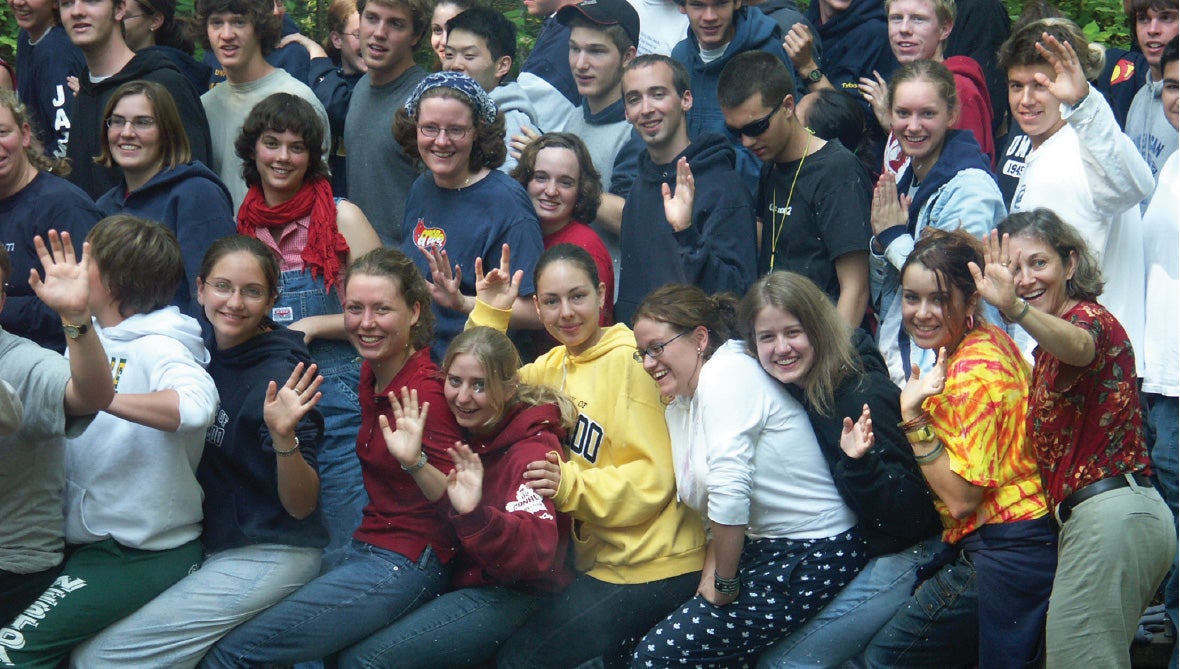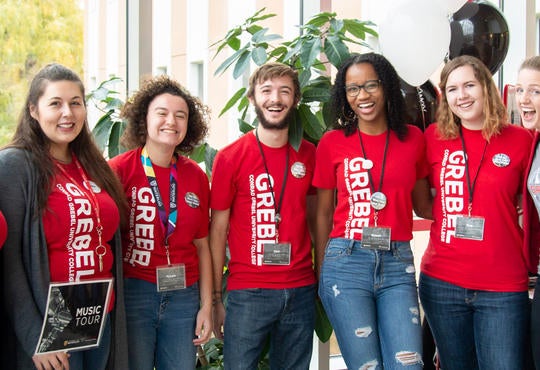
As Director of Student Services, Mary Brubaker-Zehr oversees and administers the residence program at Grebel.
Grebel and its Student Services department has a unique vision for residence life. It includes expectations for participation, encouragement to explore questions of significance, involvement in chapels and community suppers, engagement with faculty and staff, and accountability to one another for creating a hospitable environment. Our staff to student ratio is one of the best on the UWaterloo campus, as is the one-on-one care and attention we give to residents and associates alike. We endeavour to equip our students with enduring values of generosity, creativity, and compassion. Community building, leadership development, active service, and global engagement are also priorities for our department.
In the 1980s, I lived at Grebel and flourished within the community’s balance of nurture and challenge. Since 1996, I have had the privilege to ‘pay it forward’ in my role as Director of Student Services. I am grateful for a professional study leave from January to May 2018 that allowed me to start a story collection project. The following six pages are based on my reflections, research, and interviews.
In the 2012 Student Services departmental review, the external reviewers noted that Grebel’s residential program is influencing students in remarkable ways and urged us to make this reality known more broadly. As a result of this feedback, I decided to interview alumni to learn about the impact of Grebel’s residential community on their lives. How did Grebel shape them? Did it influence their life choices and vocations? Were their ethics and values affected? Are they different today because of their Grebel community experience? I was confident that there were alumni with a story to tell, and I was eager to listen. I believed, as community builder John McKnight suggests, that there is power in our memories and stories. In them are gems to be found, lessons to be learned, and capacity amongst us to be recognized and celebrated.
By means of social media and Grebel Now, I invited Grebel alumni to contact me if interested in a conversation about their Grebel experience. Over the course of four months, twenty-two former students, from the 1960s to 2017 reached out. While I have not been able to interview everyone, the interviews that did occur were lively and sincere. I conducted some in person and others via Skype. Some wanted the questions ahead of time to prepare, while others preferred off-the-cuff conversations. Each interview started with memories and storytelling. This broke the ice and kindled the imaginations of the interviewees as they considered how their Grebel experience had affected them, then and now. To say it was a privilege to visit with these alumni is an understatement. It was inspirational. What follows is a glimpse of what I heard.
Grebel’s ‘fill-the-table practice’ is unique and influential. Students are encouraged to fill the first empty chair at mealtimes, linger for conversation, and attend Community Suppers each week. Trisha Niemeyer, a 2005 Systems Design Engineering graduate, believes the simple practice of filling the first empty chair had a profound impact on relationships and was deeply significant. “It paved the way for getting to know students I might not have otherwise taken the time to know,” she said, “and over meal conversations we were exposed to different ideas that could not be ignored.” To this day, she thinks about this community practice and wonders how she can instill a similar ‘fill the first empty chair’ culture in her workplace. “I see the same people in the lunchroom every day, but for the most part, we do not know each other. We all sit with our own little cluster. I want to do something about it but when there isn’t a culture to do something about it, it’s hard.”
Most often, alumni could not remember specific Community Supper speakers or meal details beyond Grebel’s delectable homemade bread. They did not remember how full the dining room was or how frenetic the 60 minutes sometimes felt. Instead, they remembered gathering, connecting, and the ‘magic’ of simply being together for one hour each week. They remembered feeling welcomed and valued around a table with good food and good friends. They remembered engaging with faculty and staff and their families. They remembered a sense of belonging and that they had a place in the community. “I was not a serious person back then,” says 1984 Arts graduate Melodie Flook, “so I don’t really remember any specific speakers or their topics, but I remember a feeling of belonging. I came to Grebel for fun, food, pranks, sports, and friends. However, the atmosphere at Grebel and the small and seemingly insignificant things of everyday life like warm hellos, meals together, and Community Suppers soaked into me and I could not peel it off. I didn’t notice it at the time, but the impact is forever!”
Today, personal choice has become paramount, but Hebron Hailu Gabre-Marian, a 2007 Engineering grad appreciates that Community Supper participation was not a choice but rather a community expectation. “We didn’t have to wrestle with whether or not we had time to go, it was an activity built into our schedules and it was so important,” he recalled, “even if we didn’t know it or appreciate it at the time! It helped me and other students slow down, set work aside, and re-focus. It gave us perspective. It helped us learn to listen, to be patient, and to be tolerant.”
For Megan Doyle, an early 2000s Science student, Grebel was an organic living environment where she felt free to engage in conversation. “In the safety of community, I began to ask questions and wonder about my faith, poverty, justice, and the environment in ways I had never done before. Implicitly and explicitly my ideas, passions, and principles were shaped, influencing my short- and long-term decisions.”
One alumna mentioned that Grebel’s ‘open-door culture’ paved the way for robust conversations with students of differing views. “You could pop in and out of anyone’s room and strike up a conversation.” Another expressed that Grebel opened a world of meaningful debate and gave students practice in solving problems through animated yet respectful discussion.
Grebel courses and engagement with Grebel faculty also played a vital role. One graduate remembers Tom Yoder-Neufeld’s candid statement at the beginning of his “Jesus’ Life and Legacy” course about his own Christian faith. “This was a unique thing to do in a secular university context, and it captured my attention. Tom modelled that you could be firm in your faith convictions yet enter into dialogue, debate, and discourse with respect and care.” Still others experienced the chapel program as a place where they were exposed to something different. Trish noted, “I came to see faith as a community commitment rather than an individual journey. In Chapel we had the chance to practice creativity and make mistakes, and this influences my worship planning to this day.”
Living in a diverse community where discussion was encouraged had its challenges too. Debra Worth, an Arts 2001 graduate, remembered that at times, there could be conflict, misunderstandings, and hurt feelings. Yet, meal times, sports, late night chats, and sitting in classes together were key to building relationships that then could weather strong differences of opinions and belief. Deb believes she learned about how to discuss differences but not hold on so tightly that they turned into a damaging conflict. She believes that her years at Grebel on committees, in courses, and the day-to-day living in residence helped her practice and develop important skills. “I’m not afraid to bump up against diverse views and opinions whether at work or church,” states Deb, “and I trace that back to my Grebel experience.”
This short article cannot adequately convey the depth or breadth of Grebel’s impact on alumni. For instance, it does not speak to how some learned to embrace their mental health struggles, nor how others experienced and learned the importance of hospitality. It says little about how courses at Grebel instilled life-long values of peace and justice. The best way for you to grasp more fully the impact is to read for yourself the accounts from alumni that follow—in this issue and in future issues. Grab a cup of tea, find a comfortable chair, and read on.

2004 All-College Retreat. Mary Brubaker-Zehr (BA 1985) is at the bottom right.









